Voices from Africa
Government and communities share learnings on nature-based solutions for sustainable development, climate and biodiversity.
The development and adoption of the Kunming-Montreal Global Biodiversity Framework (GBF) as part of the Convention of Biological Diversity (CBD) requires countries to revise their National Biodiversity Strategy and Action Plans (NBSAPs).
Against this backdrop, Conservation South Africa (CSA) in partnership with Conservation International (CI) Liberia and Madagascar, convened diverse stakeholders, including civil society, the private sector, policymakers, and local communities to share learnings on community-led nature-based solutions in rural communities in Liberia, Madagascar and South Africa. Community members were empowered to communicate their messages directly to policymakers in each country. The learnings were shared with Sub-Saharan African countries to inform global policy negotiations under the CBD and the subsequent revision of NBSAPs.
The work, which was undertaken from 2021 to 2023, was financed by SwedBio, a programme for biodiversity and equitable development at the Stockholm Resilience Centre funded by the Swedish International Development Cooperation Agency (SIDA).
SwedBio works to advance sustainable and equitable governance of biodiversity knowledge and policy.
Also available in French and Portuguese.
South Africa
“I depend on nature, especially for the rainfall so that there is pasture for my livestock.”
Haarith Arnolds
“Water is an advantage for everything. To live. Man and animal.”
Anny Wildshutt
“I grew up in Nouriver and, therefore, I am a child of these stones. Who played here among the stones, and grew up, and therefore, I see myself as a stone child.”
Thurston Brandt
“We don't need machines to restore our land. We now mostly rely on a bird and the wind. What the wind brings against the gabion can lie there and become a plant.”
Rosy Fortuin
Videos
Stories told by the farmers of the Leliefontein commonage, Kamiesberg in South Africa about their experiences of climate change and how they are succeeding to adapt to the impacts of climate change provide a real sense of their close relationship with and dependency upon nature to thrive. Not only do these stories speak to the challenges faced by communities that are vulnerable to climate change, but the stories also provide compelling evidence that climate adaptation strategies are improving their livelihoods and building their resilience to climate change. For more information, visit our website: www.conservation.org/south-africa Follow us on social media! Facebook: Conservation South Africa Instagram: @conservationinternational_sa ------- Research by Dr Andrea Marais-Potgieter, Plunge Research Video Production: Matthew Robinson, Trevendy Films © Conservation South Africa ------
Stories told by the farmers of Nourivier, Kamiesberg in South Africa about their experiences of climate change and how they are succeeding to adapt to the impacts of climate change provide a real sense of their close relationship with and dependency upon nature to thrive. Not only do these stories speak to the challenges faced by communities that are vulnerable to climate change, but the stories also provide compelling evidence that climate adaptation strategies are improving their livelihoods and building their resilience to climate change. For more information, visit our website: www.conservation.org/south-africa Follow us on social media! Facebook: Conservation South Africa Instagram: @conservationinternational_sa ------- Research by Dr Andrea Marais-Potgieter, Plunge Research Video Production: Matthew Robinson, Trevendy Films © Conservation South Africa ------
Stories told by three generations of women from Mvenyane, Eastern Cape, in South Africa about their experiences of climate change and how they are adapting to its impacts. Not only do these stories speak to the challenges faced by communities that are vulnerable to climate change, but the stories also provide compelling evidence that climate adaptation strategies are improving their livelihoods and building their resilience to climate change. For more information, visit our website: www.conservation.org/south-africa Follow us on social media! Facebook: Conservation South Africa Instagram: @conservationinternational_sa ------- Video production // © Conservation South Africa
Case studies
Policy briefs
Madagascar
We must join hands to be able to go further.
As our ancestors used to say, "those who unite are a rock, while those who are separated are sand."
It is true that together we are stronger. It is encouraging to see that it is no longer only organisations dedicated to the environment and its conservation, but also various actors and stakeholders, who now contribute in their own way to nature conservation; significant impacts have been observed.
Videos
Protection, conservation and restoration of biodiversity and ecosystems is a global priority. In Madagascar, for example, unsustainable fishing is being managed by Conservation International, in partnership with local fishing communities, through the closure of the octopus fishing season. Communities are receiving capacity building and benefits for complying with restrictions during the off-season to ensure that octopus, crab, shrimp, and other sea life populations can reproduce and maintain healthy population levels, and thereby avoiding depleting fishery stocks. From the practice of nature-based solutions, there are several benefits to biodiversity, the economy, to mitigating climate, and aligning with international commitments to protect marine biodiversity. Not only do stories like these speak to the challenges faced by communities that are vulnerable to climate change, but these stories also provide compelling evidence that nature-based solutions are improving their livelihoods and building their resilience to climate change. For more information, visit their website: https://www.conservation.org/south-africa/swedbio Follow us on social media! Facebook: Conservation South Africa Instagram: @conservationinternational_sa ------- Video Production: Lumahee Films © Conservation International - Madagascar ------
Mangrove ecosystems provide critical habitat for a suite of living organisms, are vital sequesters of carbon dioxide, cleaning the air, protecting coastal areas during storms and providing food for people. Although resource use in mangrove forests has gone largely unregulated, Conservation International is now working with local communities to help protect, manage and restore these keystone ecosystems. Not only do these stories speak to the challenges faced by communities that are vulnerable to climate change, but the stories also provide compelling evidence that nature-based solutions, including climate adaptation strategies, are improving their livelihoods and building their resilience to climate change. For more information, visit our website: https://www.conservation.org/south-africa/swedbio Follow us on social media! Facebook: Conservation South Africa Instagram: @conservationinternational_sa ------- Video Production: Lumahee Films © Conservation International - Madagascar ------
Case studies
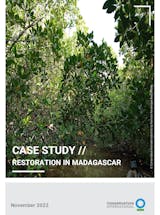
Restoration in Madagascar
Policy briefs
Liberia
It is essential to integrate gender considerations into adaptation measures and policies, recognizing and leveraging the distinct skill sets and roles of men, women, and youth in fisheries.
Protecting and restoring mangroves can also contribute to mitigating plastic pollution in coastal ecosystems.
Mangroves serve as important habitats and buffer zones that can trap and filter pollutants, including plastics, preventing them from entering marine environments.
Videos
Protection, conservation and restoration of the blue oceans economy is a priority for small-scale fisheries, both globally and in Liberia. Unsustainable fishing practices and marine pollution threatens ocean biodiversity, ecosystems and human livelihoods in Liberia. Conservation International and partners have teamed up to provide training to small-scale fishers to improve their fishing practices and to keep their coastal areas clean. Implementing nature-based solutions can have several benefits to biodiversity, the economy, to mitigating climate, and aligning with international commitments to protect marine biodiversity. Not only do stories like these speak to the challenges faced by communities that are vulnerable to climate change, but these stories also provide compelling evidence that nature-based solutions are improving their livelihoods and building their resilience to climate change. For more information, visit their website: https://www.conservation.org/south-africa/voices-from-africa Follow us on social media! Facebook: Conservation South Africa Instagram: @conservationinternational_sa LinkedIn: Conservation South Africa ------- Video produced by © Conservation International - Liberia ------
Case studies
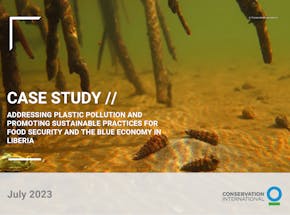
Sustainable practices in the blue economy in Liberia
Policy briefs
South-south policy exchanges
Previous work between Conservation International and Swedbio includes a series of South-south policy exchanges in Costa Rica, held between 2018-2020. Participating policy makers from Liberia, Ghana, Angola, Uganda, and Rwanda learned about the function and rewards of innovative policies, the partnerships, institutional structures and financial mechanisms that Costa Rica has developed for implementing national conservation policies, as well as the role of the government in guiding this process. The experience of the Costa Rica exchange is a confirmation that it’s possible, with a vision, political commitment, and political action, to create a foundation for a country to benefit from nature.
Contact Us
Luciano Andriamaro
Senior Director Science and Knowledge Madagascar
Conservation International
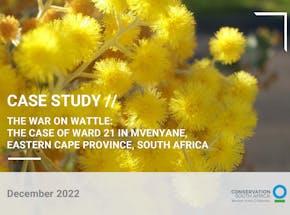

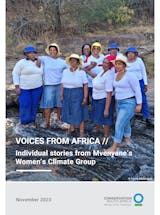
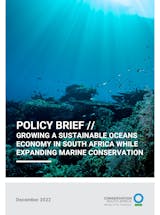
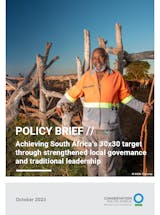

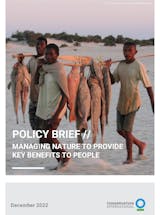
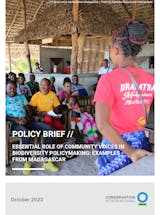
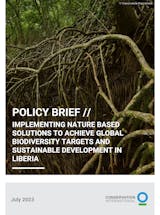
?&auto=compress&auto=format&fit=crop&w=160&h=215)